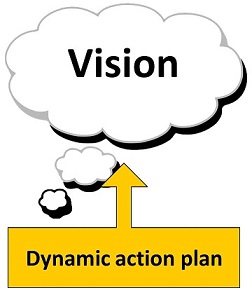


Abraham Lincoln: "If we could first know where we are, and whither we are tending, we could then better judge what to do, and how to do it."
The importance of defining the vision can be learned from the Bible. Proverbs, chapter 29, verse 18, says: "When there is no vision, the people perish."
The entrepreneur:
The entrepreneur defines his purpose - a super goal.
Defining a vision is critical for the success of a venture because it serves as a lighthouse, pointing entrepreneurs and their partners in the right direction, showing them where to go and what will be considered a success.
Entrepreneurs who work to implement an idea for a venture receive a lot of advice from those around them and encounter various possibilities and opportunities. These factors may distract entrepreneurs from their goal and cause them to shift between subjects, ultimately failing to achieve even one meaningful goal.
Hence, the importance of the vision lies in choosing the same advice, opportunities, and paths that will lead to the realization of the vision without deviating from the track that will lead to success.

Anyone can set a vision for themselves, and preferably more than one vision, each in a different area. For example, a family vision, professional goals, and a social vision, among others.
Defining a vision adds meaning to our lives and helps us to focus and achieve goals and objectives.
The vision should be meaningful, as well as both challenging and achievable, since a significant purpose precedes success.
Here is a simple way that can help you define a vision:
Close your eyes and imagine yourself three to five years in the future. How do you see yourselves? What have you achieved in the various fields of your life? If you have vision and aspirations, imagine how you will feel in a few years, assuming you have met them.
This method makes the aspirations more tangible and gives us the feeling that we can achieve our goals.
Companies usually set a supreme goal. This is essential in motivating employees to achieve this primary goal, as the supreme ambition makes it clear to everyone what the organization's aims are and its ultimate objective.
Watch Cameron Herold's lecture at TEDx Vancouver on the topic of vision.
Despite what was said above, you don't need to wait until you have a vision to start working. If there is a field that interests and excites you, immerse yourself in it. At the same time, be attentive to recognizing opportunities.
Usually, the combination of these two factors helps you discover your destiny, contribute to society, and then develop a clear vision.
If you don't have a clear vision and wait, without making progress and working, you may find yourself wasting valuable time and unable to express your abilities fully.
The Entrepreneurship for Kids Program, taught in dozens of schools in Israel and around the world, began by taking action, rather than from a vision.
Galit Zamler explains: "I simply started teaching entrepreneurship in my son's school, discovered I love the field very much, and that I bring lots of value to the students, and the vision was defined later."
Google began without a vision, as well. The following is a quote by Larry Page, one of the co-founders of Google. (Taken from the book "Success" edited by Gena Pincott, published by Matar)
"In my opinion, part of the reason for our success is that we didn't want to start a business in the first place.
We conducted research at Stanford University. Google, more or less, grew out of that, and we didn't even mean to build a search engine in the beginning.
We had an interest in the internet and data mining, and eventually, we developed search technology. We realized it was very good, and then we built the search engine.
Then we told our friends and our professors. Pretty fast, more than 10,000 people used it daily."
Examples of Visions of Countries, Individuals, and Companies:

The vision for the establishment of the State of Israel: "A Home for the Jewish People."
This vision is presented in Module 3 of the Entrepreneurship for Kids Program as an example to illustrate the importance of defining a substantial vision.
The Vision of the Entrepreneurship for Kids Program

Galit Zamler defined the vision of the EFK Program like this:
"To enable as many children in the world as possible, regardless of their academic achievements and/or socioeconomic backgrounds, to acquire skills for success in life through enjoyable and experiential learning of all stages of the entrepreneurial process."

Omri Caspi, the first Israeli player in the N.B.A., said:
"I have dreamed of N.B.A. since age zero." This dream served as a compass, and Omri directed himself to make this dream come true.

In 1975, Bill Gates, the founder of Microsoft, outlined his company's vision: "A computer in every office and every home."
Today, we accept this reality for granted, but in the past, it was a utopian dream.
In 2015, under Satya Nadella's leadership, Microsoft defined its new vision: "Our mission is to empower every person and organization on the planet to achieve more."

Google's vision statement:
"Google's mission is to organize the world's information and make it universally accessible and useful."

Wikipedia's mission: "To build the most accessible and comprehensive source of free knowledge in the world."
Wikipedia delivers free knowledge to people, by people, in hundreds of languages around our planet.
Jimmy Wales, the founder, explained their vision: "Imagine a world in which every single person on the planet is given free access to the sum of all human knowledge. That's what we're doing."
Watch Jimmy's lecture at TED: The birth of Wikipedia.

IKEA's goal is to "create a better everyday life for many people."
The company fulfills its vision by offering a wide range of well-designed and functional furniture products at affordable prices, making them accessible to as many people as possible.

In the beginning, even before Twitter was founded, one of its founders defined his ambitions, which would later form the basis for the company's vision: "One day, all the celebrities in the world will use it, and bands are going to use this to communicate with their fans."
Twitter's official vision statement was defined as follows: "Our mission: To give everyone the power to create and share ideas and information instantly, without barriers."
Sometimes it seems easy to set a goal, but a dream without the tireless activity to achieve it will remain a dream.
The entrepreneur:
A mission is not defined as a vision if it is not significant, and being meaningful makes it inevitably hard to achieve, and here is the challenge that the entrepreneur faces.
Every entrepreneur faces difficulties in realizing their "big purpose." One of the key differences between a failed entrepreneur and a successful entrepreneur is their willingness to persist in the face of difficulties and avoid giving up, thereby avoiding the temptation to succumb to despair.
Example of a project that fulfills the vision despite difficulties:
Arava Power Company's goal: "Arava Power Company aims to be the leading supplier of electricity from solar energy in Israel. Partnering with Kibbutzim and Moshavim, the company intends to produce 1000 megawatts of solar power by 2020."
Kibbutz Ketura inaugurated Israel's first solar field. Ostensibly, setting up a solar field in Israel - a sunny country - sounds like a promising venture. However, John Cohen, CEO of Arava Power, explained that, as a pioneer in this field, he still faces numerous challenges in realizing his ambitious goals.
Yosef Abramowitz, who thought about the project, said in an interview with Maariv Magazine, "At first, everyone told me that it is impossible. When someone tells me that it is impossible, it gives me courage, it challenges me, and it makes my eyes light up."
Indeed, the difficulties in setting up the solar farm were and still are many and varied. They are mostly bureaucratic, involving approval from government agencies, numerous meetings with the IEC, the licensing process, and additional requirements.
Despite all that, the project was carried out, and they inaugurated the first solar field in Israel.
The ability to cope with difficulties is what leads the entrepreneur to the long-awaited moment of inauguration of the place.

If the vision is the compass pointing in the direction the company is heading, then the question arises: When do you update a vision?
A vision is meant to define the company's intentions for some years, but once the vision has been realized, the company needs to "reinvent" itself and come up with a new, meaningful, and challenging vision.
You update the vision in response to technological advancements, environmental and social changes, and other relevant factors. And the vision must adapt to the changing reality.
Often, a company changes its vision after gaining a better understanding of the market in which it operates and identifying more meaningful growth directions.
A company that accomplished its vision and hasn't updated it will die down very quickly, as demonstrated by companies like Kodak, Blockbuster, Nokia, Blackberry, and others.
There's no time for resting on laurels; you must move forward into the future.
Waze, for instance, has become the most popular real-time navigation system in many countries worldwide. Now, we aspire to become a company that helps people find a shared ride through carpooling, thereby reducing road congestion and improving the overall transportation experience.
Facebook, in its early stages, aspired to give people the power to share and make the world more open and connected. Facebook's vision as of 2017 is: "Give people the power to build community and bring the world closer together."
As mentioned above, Microsoft's vision was updated a long time ago and is now broadly defined as "Empower every person and every organization on the planet to achieve more."

While we define the long-term vision, it's clear to us what we want to achieve. However, a plan is ever-changing and dynamic.
Each startup must have a strategic work plan in place. Still, it's also essential to be attentive to the conditions in which we are operating, to the changes that are happening within and around us, so that we can match the plan and strategy, ultimately accomplishing the vision.
Working alongside a definite plan, often one that was prepared in advance by external specialists, can harm and even lead to the project's failure.
The founders of the SpaceIL project explained that they had the vision to land an Israeli spaceship on the moon, but if they had worked according to an organized work plan, they probably wouldn't have managed to launch such a spacecraft. Many unforeseen factors in the process occurred over a couple of years, requiring the entrepreneurs to have a flexible mindset, creativity, courage, and make changes and adjustments.